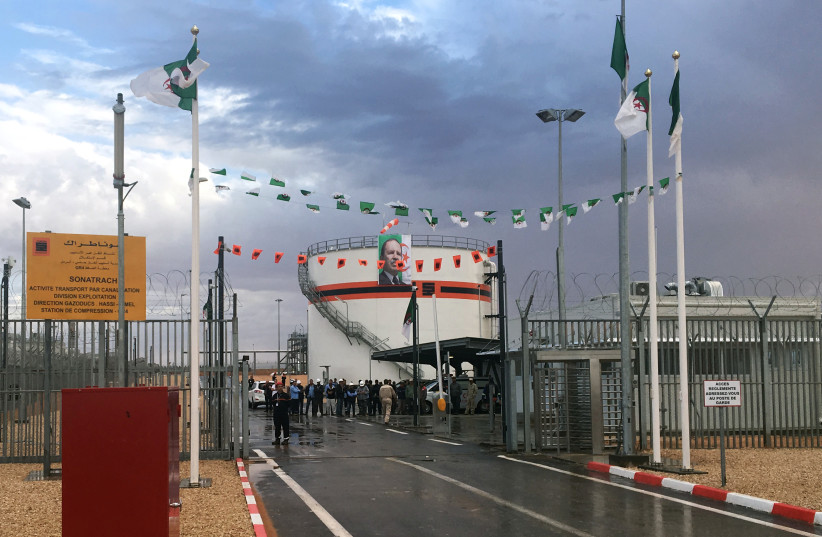A recent article at Al-Ain media in the Gulf said that Algeria was stuck between a rock and a hard place – it could accept “Europe’s money” or “Russia’s friendship.”
This is an interesting juxtaposition because Algeria has been in the news lately. Articles have presented the North African country as being in the spotlight because of Europe’s need for natural gas. Bloomberg and others have pointed this out in recent reports. One article at Reuters says Europe depends on Algeria for a third of its natural gas.
“These concerns make Western countries in a race against time to secure alternative supplies of Russian gas, as Algeria appears as an appropriate solution thanks to its huge gas reserves and its presence near Europe,” the Al-Ain article says, explaining that supplying Europe could help the country's financial situation – but “In turn, it could negatively affect the growing relations between Algeria and Russia.”
“However, it remains unclear to what extent Algeria, a member of the Organization of the Petroleum Exporting Countries (OPEC), can be an actual alternative to Russia, at a time when Algeria is suffering from the stagnation of its oil exports due to a lack of investment in the sector, and the rapid growth of domestic demand,” the article says. "Algeria adopts a distinctly independent foreign policy, led by civilians and military personnel, whose roots go back to the war of liberation against the French occupation in the 1960s."
So what else is going on?

The US is also interested in Algeria and is apparently in discussions with companies operating there, the article claims. “Several foreign energy companies, such as Italy's Eni, France's Total Energies, and Norway's Econor, operate in Algeria under production sharing contracts.”
But Azerbaijan's exports are not enough to make up for shortages in case of crisis with Russia over Ukraine. Recent reports say the US would stop the Nord Stream 2 pipeline if a crisis breaks out. Germany is not so sure about that plan. Meanwhile, European countries have also been looking to Azerbaijan and other countries for supplies.
Algeria also has other foreign policy problems. “In late October, Algeria closed a major pipeline that transports gas to Spain through Morocco, after the escalation of the dispute between the two Arab neighbors over relations between Morocco and Israel and the Western Sahara crisis,” the report says.
The author reminds us that Algeria was a major force in the Non-Aligned Movement during the Cold War era. Algeria's official stance is hatred toward Israel. Algerian Foreign Minister Ramtane Lamamra denounced the African Union's decision to grant the Jewish state an observer status as a "double mistake,” according to recent reports. "We were not the ones who initiated the granting of observer status to anyone," Lamamra said in an interview with Radio France International and the France 24 satellite channel.
OF INTEREST here is the fact that Arab and North Africa states were being called upon not to allow Israel to be an observer of a group of states in Africa. This smacks of arrogance and colonial mentalities, but it is par for the course for Algeria’s official stance of opposing Israel.
It’s not clear how Algeria figures into the larger quest for influence in Africa. Russia, China, Iran and Turkey are all seeking more influence in the continent. In addition extremist groups continue to destabilize the Sahel. Reports say that Algeria has walked away from a deal to buy Russian warplanes.
Meanwhile, there are concerns that Russia has sent military contractors to Mali and other countries in the region. Moscow also plays a role in Libya and the Central African Republic, according to reports. Two days ago, Russia said it has nothing to do with military contractors working in Mali, President Vladimir Putin said while visiting French President Emmanuel Macron. The two leaders recently met again. Mali has slammed France in recent days, expelling the French ambassador and accusing Paris of trying to divide the country.
According to Al-Jazeera, “the celebrations on Friday [in Mali], where people waved Russian flags and burned cardboard cut-outs of French President Emmanuel Macron, came as tensions between the West African country and its former colonial power have been steadily soaring.”
All this matters because, although the Ukraine crisis is in the spotlight, the issues happening in Algeria and Mali have widespread implications as well.
This also matters because of Morocco. Israel has kindled important relations with Rabat over the past two years. Israel’s defense minister was in Morocco in November.
But in Washington, some US officials and politicians are still unhappy over the Trump administration's recognition of Western Sahara as part of Morocco. “We look like hypocrites now. We oppose Russia’s invasion of Ukraine and refuse to recognize their control of Crimea, but we support Morocco’s invasion and control over Western Sahara,” said US Senator Chris Murphy in December 2020.
The Western Sahara issue continues to ruffle feathers in Washington. Although Morocco is part of the Abraham Accords and is important to US policy, these issues relating to Western Sahara will continue to overshadow Morocco-US relations.
